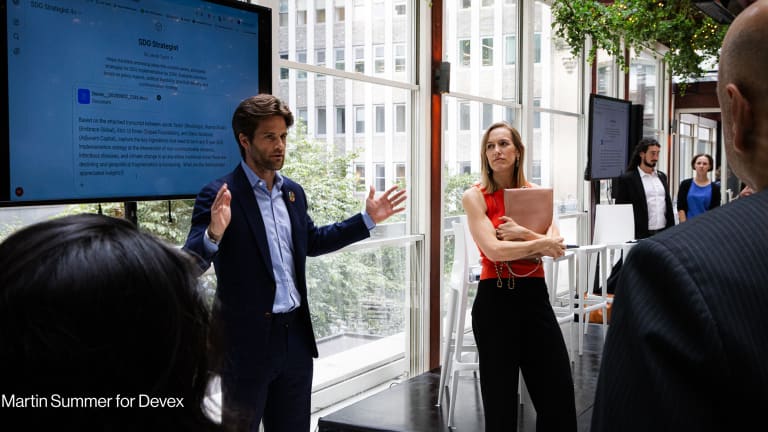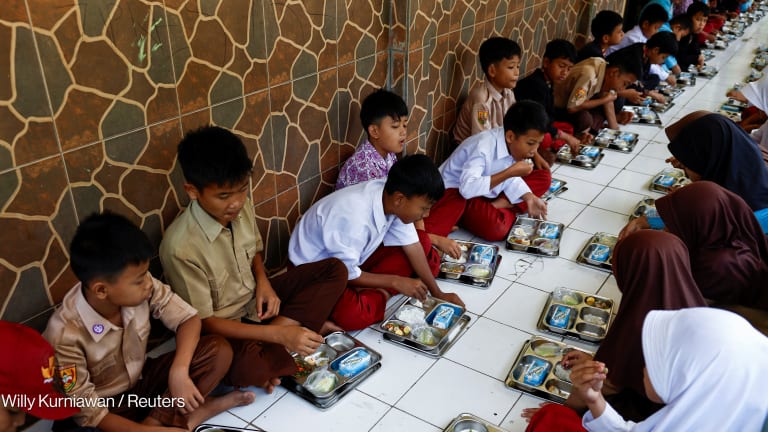
Extreme poverty has been halved and humans in general have never been richer, healthier or better educated. More than 600 million people have been brought out of poverty in China alone. But average global improvement is of little help for the over 1 billion people still living in extreme poverty. There are many challenges. The complete eradication of extreme poverty by 2030 and a new set of sustainable development goals will be agreed when world leaders meet at the United Nations in New York in September.
Obviously we need leadership from the U.S., China and others in New York, but big powers cannot solve all the world’s problems. There are a lot of things smaller countries, like Lithuania, can do for the planet too.
Good policies
Most important is policies. We must learn from successes and do more of what works.
In Ethiopia, child mortality has been reduced by two-thirds in two decades with the help of thousands of health workers deployed across the country. Fifteen year olds in Vietnam are now doing better at school than children in much richer countries. South Korea has gone from one of the poorest countries in the world to one of the richest by focusing on education and industrialization — young Koreans today are 390 times richer than their grandparents were. Costa Rica is currently running 100 percent on renewable electricity.
Lithuania, meanwhile, has successfully transitioned into a democratic market economy and is now one of the fastest-growing economies in Europe. The country may consider how it can share its experience of successful transformation with other countries. After all, the key to development is to learn from success and replicate policies that work on a global scale.
More and better aid, investments and tax
Money is also important. Development aid has been a huge success and remains at a record high of $135 billion, an increase of 66 percent since 2000. And new donors are adding to this total.
China is now a major provider of aid. Turkey is above the Organization for Economic Cooperation and Development average and hugely generous to Syrian refugees at the same time. The United Arab Emirates is the most generous country in the world and gave 1.17 percent of national income to aid last year. Hungary and Estonia increased development spending more than anyone at 25 percent and 19 percent, respectively, last year.
Can Lithuania find ways to gradually step up spending for less fortunate people on the planet?
We need more and better aid. But we also need more of the two biggest sources of development finance in the world: private investments and tax.
Foreign direct investments in developing countries are five times greater than aid. Donors can use aid to mobilize much more private investment. By blending public and private investments, the European Union used $2 billion in aid to mobilize around $40 billion for things like constructing electricity networks, financing major road projects and building water and sanitation infrastructure in recipient countries. This may also provide opportunities for Lithuanian companies.
Domestic taxes are by far the biggest source of funding for schools and hospitals in developing countries, even in many of the poorest countries. Governments in OECD countries generate on average a third of their domestic economies in taxes. Middle-income countries generate just around a fifth and some of the least-developed countries only achieve 10 percent. Just an additional 1 percent of developing countries’ domestic product in taxes would mobilize almost twice the amount of total global development aid.
Relatively small amounts of development aid can mobilize much more domestic resources for health and education. Spending development assistance to mobilize more tax revenues has proven highly effective. For example, $500,000 in development aid to support the tax authorities in the Philippines returned more than $1 billion in increased taxes.
Coalitions for action
For the first time in human history, we have the knowledge and resources to eradicate poverty while preserving the planet. It is a matter of leadership and to mobilize the political will to just do it. But we cannot wait for a master plan or expect presidents Barack Obama or Xi Jinping to fix all problems.
Everyone can lead coalitions addressing specific development challenges. My nation Norway joined with Brazil, Indonesia and other rain forest nations to inspire the United Nations-REDD rainforest coalition to save the magnificent rain forests. So far Brazil has reduced deforestation by 80 percent and Asia’s largest palm oil producers have promised to not contribute to any further deforestation. Bill and Melinda Gates made the initial investments to energize Gavi, the Vaccine Alliance — a successful partnership that so far has vaccinated 500 million children and saved millions of lives. A poor country like Congo has joined with UNITAID and imposed a tax of 10 cents per oil barrel to fight disease across Africa.
There are plenty of other coalitions for action just waiting for leadership. Let me challenge Lithuania to look for “niches” where you can lead the world.
I am looking forward to Lithuania joining the OECD and the Development Assistance Committee, the club of donors, as soon as possible. There is a lot we can achieve together. We have a historic opportunity to eradicate poverty and put the planet on a new green path. All we need are good policies, more and better development finance and effective coalitions for action. Everyone can contribute.
Erik Solheim will deliver his Kapuscinski development lecture, “Development Assistance in a New World,” at 4 p.m. Central European Time on May 13. Watch the live webcast at kapuscinskilectures.eu and join the #KAPTalks debate on Twitter.
Join the Devex community and access more in-depth analysis, breaking news and business advice — and a host of other services — on international development, humanitarian aid and global health.








